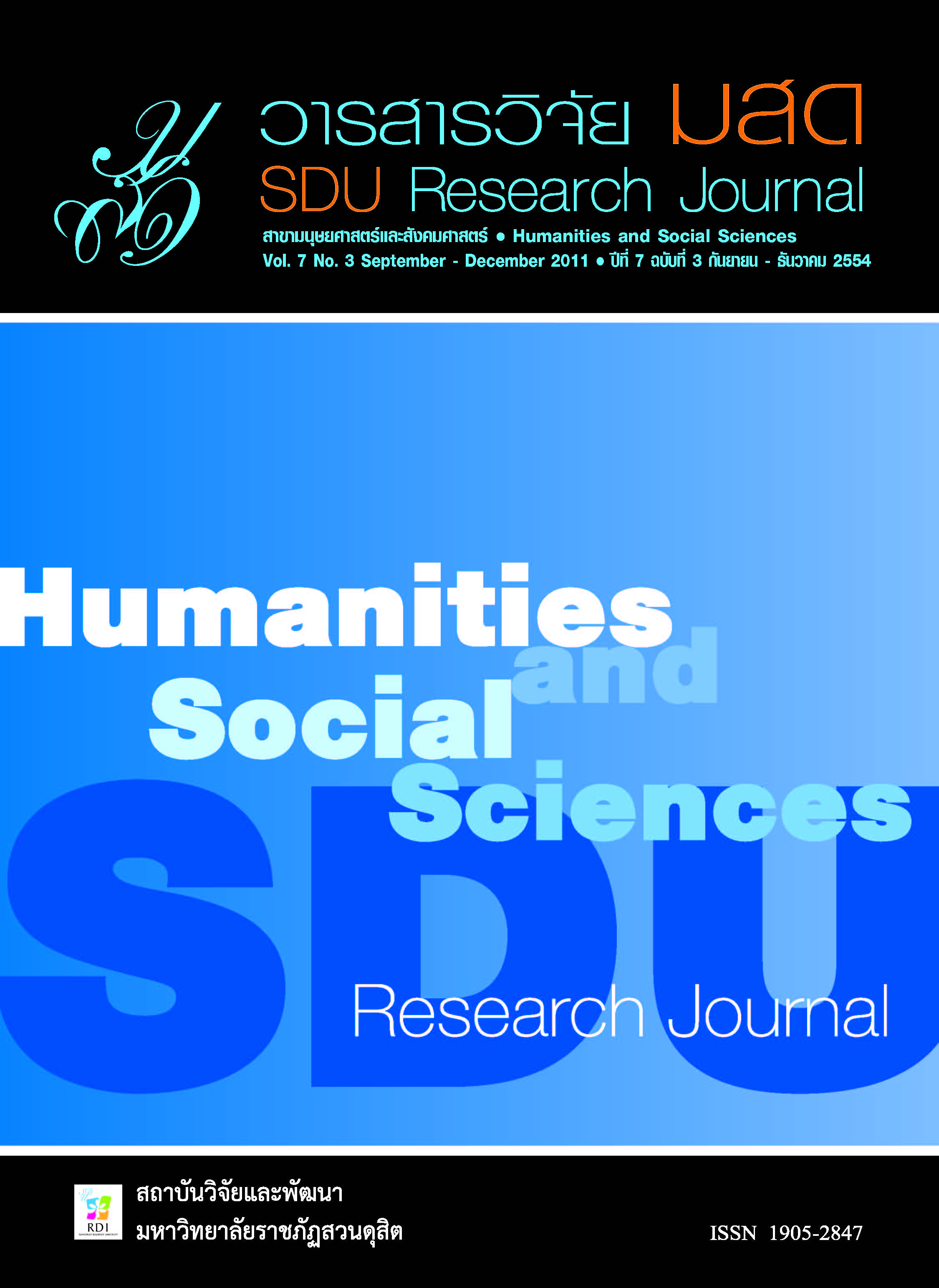ความสามารถในการสื่อสารแบบวัจนภาษาของเด็กปฐมวัย โดยใช้กิจกรรมการเรียนการสอนแบบจิตปัญญา
Keywords:
การสื่อสาร, วัจนภาษา, จิตปัญญา, Communication, Verbal language, Psycho-IntellectualAbstract
บทคัดย่อ
การศึกษาครั้งนี้มีจุดมุ่งหมายเพื่อศึกษาความสามารถในการสื่อสารแบบวัจนภาษาของเด็กปฐมวัยโดยใช้กิจกรรมการเรียนการสอนแบบจิตปัญญา ประชากรที่ใช้ในการศึกษาครั้งนี้ เป็นเด็กปฐมวัย อายุระหว่าง 5-6 ปี ที่กำลังศึกษาอยู่ชั้นอนุบาลปีที่ 2 ภาคเรียนที่ 2 ปีการศึกษา 2552 ของเครือข่ายที่ 6 อำเภอจอมบึง สังกัดสำนักงานเขตพื้นที่การศึกษาราชบุรี เขต 1 จำนวน 8 โรงเรียน กลุ่มตัวอย่าง ได้แก่ โรงเรียนวัดสูงเนินราษฎรบำรุง จำนวน 1 ห้องเรียน มี 15 คน ซึ่งได้มาโดยการสุ่มตัวอย่างแบบกลุ่ม (Cluster Random Sampling) โดยวิธีการจับฉลาก เพื่อเป็นกลุ่มทดลองกิจกรรมการเรียนการสอนแบบจิตปัญญา เป็นระยะเวลา 8 สัปดาห์ สัปดาห์ละ 3 วัน
เครื่องมือที่ใช้ในการวิจัยครั้งนี้ คือ
1. เครื่องมือที่ใช้ในการทดลอง ได้แก่ แผนการจัดการเรียนการสอนแบบจิตปัญญา
2. เครื่องมือเก็บรวบรวมข้อมูล ได้แก่ แบบประเมินความสามารถในการสื่อสารแบบ วัจนภาษาที่มีค่าความเชื่อมั่นเท่ากับ .92 แบบที่ใช้ในการวิจัย One-Group Pretest-Posttest Design และ วิเคราะห์ข้อมูลใช้สถิติ t-test for Dependent sample
ผลการศึกษาพบว่า
1.ระดับความสามารถในการสื่อสารแบบวัจนภาษาของเด็กปฐมวัยหลังการจัดกิจกรรมการเรียนการสอนแบบจิตปัญญาโดยรวมอยู่ในระดับดี ส่วนรายด้าน พบว่า ด้านความเข้าใจภาษาอยู่ในระดับดีมาก ส่วนด้านการสร้างประโยค การสนทนาโต้ตอบ และความคล่องภาษา อยู่ในระดับดี
ระดับความสามารถในการสื่อสารแบบวัจนภาษาของเด็กปฐมวัยหลังการจัดกิจกรรมการเรียนรู้แบบจิตปัญญาสูงขึ้นกว่าก่อนจัดกิจกรรมการเรียนรู้แบบจิตปัญญาอย่างมีนัยสำคัญทางสถิติที่ระดับ .01
คำสำคัญ : การสื่อสาร, วัจนภาษา, จิตปัญญา
Abstract
The purpose of this study was to investigate the effects of psycho-intellectual learning activities on young children’s verbal communication ability. The sample was comprised of 15 young children from Wat Sungnern Radsadonbanrung School. They were selected by cluster random sampling from a group of young children ages five to six who were in kindergarten level two at eight schools in network six in the Choom Bung district, Ratchaburi. The sampling was conducted in the second semester of the 2009 academic year.
This design of this study was a one group, pre-test post-test. The instructional instrument included a lesson plan based on the concept of psycho-intellectual learning approach. The intervention was conducted three days a week for eight weeks. The data were collected by a form designed to measure verbal communication (reliability = .92) and analyzed by a dependent t-test.
The research results were as follows.
1. After the intervention, the verbal communication ability of young children was generally good. Considering each aspect, their language comprehension was very good, while their sentence construction, conversation and fluency were good.
2. Their verbal communication ability before and after the intervention was significantly different (p = .01).
Keywords : Communication, Verbal language, Psycho-Intellectual








